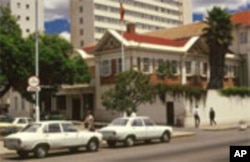Zimbabwe's fragile transition government suffered another blow recently when President Robert Mugabe stripped authority from several cabinet ministries led by members of the Movement for Democratic Change.
The move, a clear violation of the spirit of the agreement Mugabe signed in 2008 to create the transitional government and end the country's long-running political crisis, demonstrates yet again Mugabe's refusal to share power despite demands for change.
Democracy and its grounding in government checks and balances are not entirely dead in the Southern Africa nation, however. Glimmers of life for representative government are seen in Zimbabwe's Parliament, which in recent weeks has shown a healthy independence from the nation's tradition of one-party rule.
Lawmakers are adding the final touches to a law reforming the nation's central bank, which under Mugabe's long rule adopted policies that ruined the nation's economy. They, along with the Prime Minister and leading members of the MDC, are balking at a Mugabe plan to require all large businesses to have majority black Zimbabwean ownership, a move that will frighten away badly needed foreign investment.
The election of the nation's first opposition Speaker of Parliament since independence has been upheld by the courts. And its Committee on Mines has begun an investigation into government activities in the controversial Marange diamond fields, where security forces have been found to be abusing miners and 300,000 carets of diamonds held by the Mines Ministry briefly went missing. The MDC has demanded all mining in Marange be halted until the parliamentary probe is completed and the government has a plan to develop the valuable resource for the national, not private, good.
The United States had hoped for as much from Mugabe after he signed the Global Political Agreement in September 2008 and agreed to the transitional government in February 2009. The transitional government must operate as he himself agreed to, but for now it appears it is up to Parliament and civil society to foster democracy and respect for the rule of law and human rights.
The move, a clear violation of the spirit of the agreement Mugabe signed in 2008 to create the transitional government and end the country's long-running political crisis, demonstrates yet again Mugabe's refusal to share power despite demands for change.
Democracy and its grounding in government checks and balances are not entirely dead in the Southern Africa nation, however. Glimmers of life for representative government are seen in Zimbabwe's Parliament, which in recent weeks has shown a healthy independence from the nation's tradition of one-party rule.
Lawmakers are adding the final touches to a law reforming the nation's central bank, which under Mugabe's long rule adopted policies that ruined the nation's economy. They, along with the Prime Minister and leading members of the MDC, are balking at a Mugabe plan to require all large businesses to have majority black Zimbabwean ownership, a move that will frighten away badly needed foreign investment.
The election of the nation's first opposition Speaker of Parliament since independence has been upheld by the courts. And its Committee on Mines has begun an investigation into government activities in the controversial Marange diamond fields, where security forces have been found to be abusing miners and 300,000 carets of diamonds held by the Mines Ministry briefly went missing. The MDC has demanded all mining in Marange be halted until the parliamentary probe is completed and the government has a plan to develop the valuable resource for the national, not private, good.
The United States had hoped for as much from Mugabe after he signed the Global Political Agreement in September 2008 and agreed to the transitional government in February 2009. The transitional government must operate as he himself agreed to, but for now it appears it is up to Parliament and civil society to foster democracy and respect for the rule of law and human rights.





